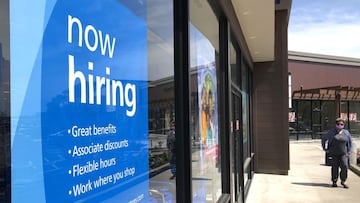March Employment Report: What does it tell us about the health of the US economy?
The March employment report has shown robust job growth that far surpassed the expectations of economists, while the unemployment rate fell to 3.8%.

The highly anticipated March employment report has surpassed the expectations of economists, with employers adding 303,000 non-farm jobs last month, according to the Bureau of Labor Statistics.
The figure is almost 100,000 higher than the projected net gain of 205,000 for the month. The increase in jobs is also 10% more than the 270,000 registered in February. The employment gains took place in the sectors of health care, which added 72,300 jobs; government, which added 71,000; leisure and hospitality, which increased by 49,000; and construction, which saw 39,000 more jobs.
Meanwhile, unemployment slipped and remained below 4% at 3.8%, down from 3.9% the previous month. This level is near a half-century low.
On the average hourly wage front, there was an increase in March, going up 0.3% month-over-month compared with the previous month’s 0.1%.
READ ALSO: 5 takeaways from the March Employment Report
What does the March employment report mean for the US economy?
President Joe Biden said the employment report “marks a milestone in America’s comeback.”
“Three years ago, I inherited an economy on the brink. With today’s report of 303,000 new jobs in March, we have passed the milestone of 15 million jobs created since I took office,” the president said in a statement.
“That’s 15 million more people who have the dignity and respect that comes with a paycheck.”
READ ALSO: Bill Gates and Microsoft: A look back at the tech giant’s origins
The lower unemployment rate shows that the economy remains hardy, but at the same time stokes worries that it will cause the Federal Reserve to postpone cutting interest rates further.
Larger paychecks and a vigorous job market are both signs of a healthy economy, but they could also result in consumers increasing their spending, which could in turn result in higher inflation. The next Consumer Price Index report will give the Fed more basis to help the body decide on whether and when to cut rates.






